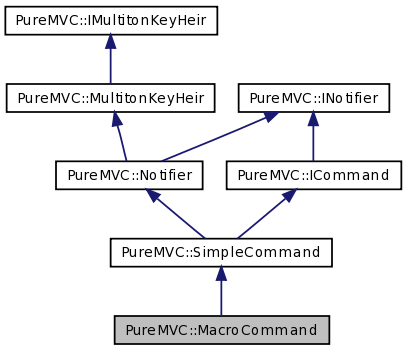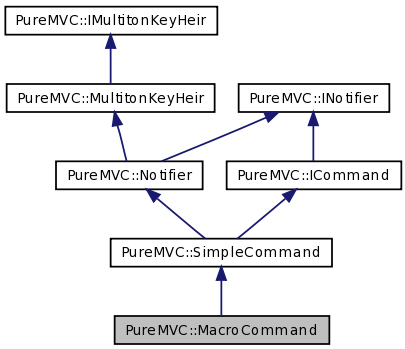A base ICommand implementation that executes other ICommands.
More...
#include <pmvcpp.h>


Public Member Functions | |
| MacroCommand () | |
| Constructor. | |
| void | execute (INotification *notification) |
Execute this MacroCommand's SubCommands. | |
| void | sendNotification (int notificationName, void *body, int notificationType) |
Create and send an INotification. | |
| void | sendNotification (int notificationName, int notificationType) |
Send a INotification. | |
| void | sendNotification (int notificationName, void *body) |
Send a INotification. | |
| void | sendNotification (int notificationName) |
Send a INotification. | |
| void | initializeNotifier (std::string key) |
| Initialize this INotifier instance. | |
| virtual void | setMultitonKey (std::string key) |
| Set multiton key. | |
| virtual std::string | getMultitonKey () |
| Get multiton key. | |
Protected Member Functions | |
| void | addSubCommand (ICommand *command) |
Initialize the MacroCommand. | |
| IFacade * | getFacade () |
Protected Attributes | |
| std::vector< ICommand * > | subCommands |
| Subcommands. | |
A base ICommand implementation that executes other ICommands.
A MacroCommand maintains an list of ICommand Class references called SubCommands.
When execute is called, the MacroCommand instantiates and calls execute on each of its SubCommands turn. Each SubCommand will be passed a reference to the original INotification that was passed to the MacroCommand's execute method.
Unlike SimpleCommand, your subclass should not override execute, but instead, should override the initializeMacroCommand method, calling addSubCommand once for each SubCommand to be executed.
| MacroCommand::MacroCommand | ( | ) |
Constructor.
You need to define a constructor, and add all your subcommands within it.
In your subclass, define a constuctor to initialize the MacroCommand's SubCommand list with ICommand class references like this:
<listing> // Initialize MyMacroCommand MacroCommandSubclass::MacroCommandSubclass( ) { this->addSubCommand( new FirstCommand() ); this->addSubCommand( new SecondCommand() ); this->addSubCommand( new ThirdCommand() ); } </listing>
Note that SubCommands may be any ICommand implementor, MacroCommands or SimpleCommands are both acceptable.
| void MacroCommand::addSubCommand | ( | ICommand * | command | ) | [protected] |
Initialize the MacroCommand.
In your subclass, override this method to initialize the MacroCommand's SubCommand list with ICommand class references like this:
<listing> // Initialize MyMacroCommand override protected function initializeMacroCommand( ) : void { addSubCommand( com.me.myapp.controller.FirstCommand ); addSubCommand( com.me.myapp.controller.SecondCommand ); addSubCommand( com.me.myapp.controller.ThirdCommand ); } </listing>
Note that SubCommands may be any ICommand implementor, MacroCommands or SimpleCommands are both acceptable.
| void MacroCommand::execute | ( | INotification * | notification | ) | [virtual] |
Execute this MacroCommand's SubCommands.
The SubCommands will be called in First In/First Out (FIFO) order.
| notification | the INotification object to be passsed to each SubCommand. |
Implements PureMVC::SimpleCommand.
| std::string MultitonKeyHeir::getMultitonKey | ( | ) | [virtual, inherited] |
Get multiton key.
Returns the multiton key.
Implements PureMVC::IMultitonKeyHeir.
| void Notifier::initializeNotifier | ( | std::string | key | ) | [virtual, inherited] |
Initialize this INotifier instance.
This is how a Notifier gets its multitonKey. Calls to sendNotification or to access the facade will fail until after this method has been called.
Mediators, Commands or Proxies may override this method in order to send notifications or access the Multiton Facade instance as soon as possible. They CANNOT access the facade in their constructors, since this method will not yet have been called.
| key | the multitonKey for this INotifier to use |
Implements PureMVC::INotifier.
| void Notifier::sendNotification | ( | int | notificationName | ) | [virtual, inherited] |
Send a INotification.
Convenience method to prevent having to construct new notification instances in our implementation code.
| notificationName | the name of the notification to send |
Implements PureMVC::INotifier.
| void Notifier::sendNotification | ( | int | notificationName, | |
| void * | body | |||
| ) | [virtual, inherited] |
Send a INotification.
Convenience method to prevent having to construct new notification instances in our implementation code.
| notificationName | the name of the notification to send | |
| body | the body of the notification (optional) |
Implements PureMVC::INotifier.
| void Notifier::sendNotification | ( | int | notificationName, | |
| int | notificationType | |||
| ) | [virtual, inherited] |
Send a INotification.
Convenience method to prevent having to construct new notification instances in our implementation code.
| notificationName | the name of the notification to send | |
| type | the type of the notification (optional) |
Implements PureMVC::INotifier.
| void Notifier::sendNotification | ( | int | notificationName, | |
| void * | body, | |||
| int | notificationType | |||
| ) | [virtual, inherited] |
Create and send an INotification.
Keeps us from having to construct new INotification instances in our implementation code.
| notificationName | the name of the notiification to send | |
| body | the body of the notification (optional) | |
| type | the type of the notification (optional) |
Implements PureMVC::INotifier.
| void MultitonKeyHeir::setMultitonKey | ( | std::string | key | ) | [virtual, inherited] |
Set multiton key.
Sets the multiton key.
| key | The name of the key |
Implements PureMVC::IMultitonKeyHeir.
std::vector<ICommand*> PureMVC::MacroCommand::subCommands [protected] |
Subcommands.
Holds all the subcommands.
 1.6.1
1.6.1